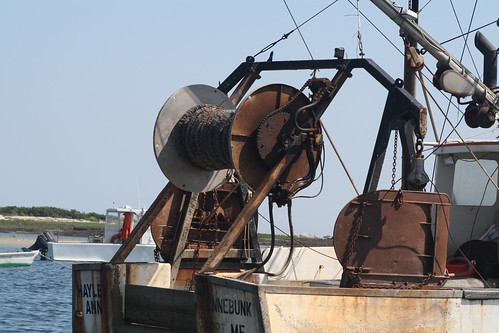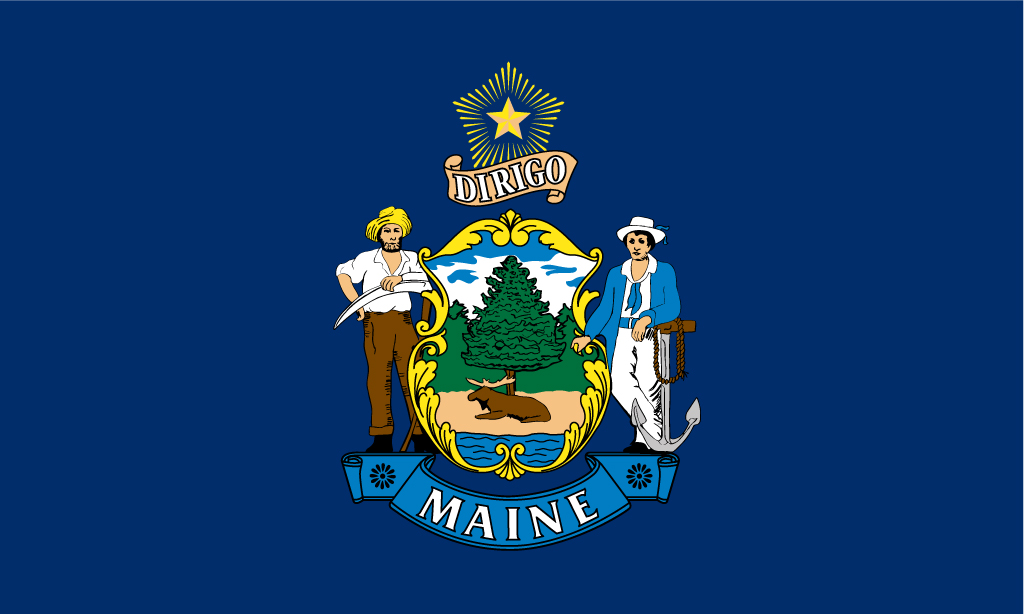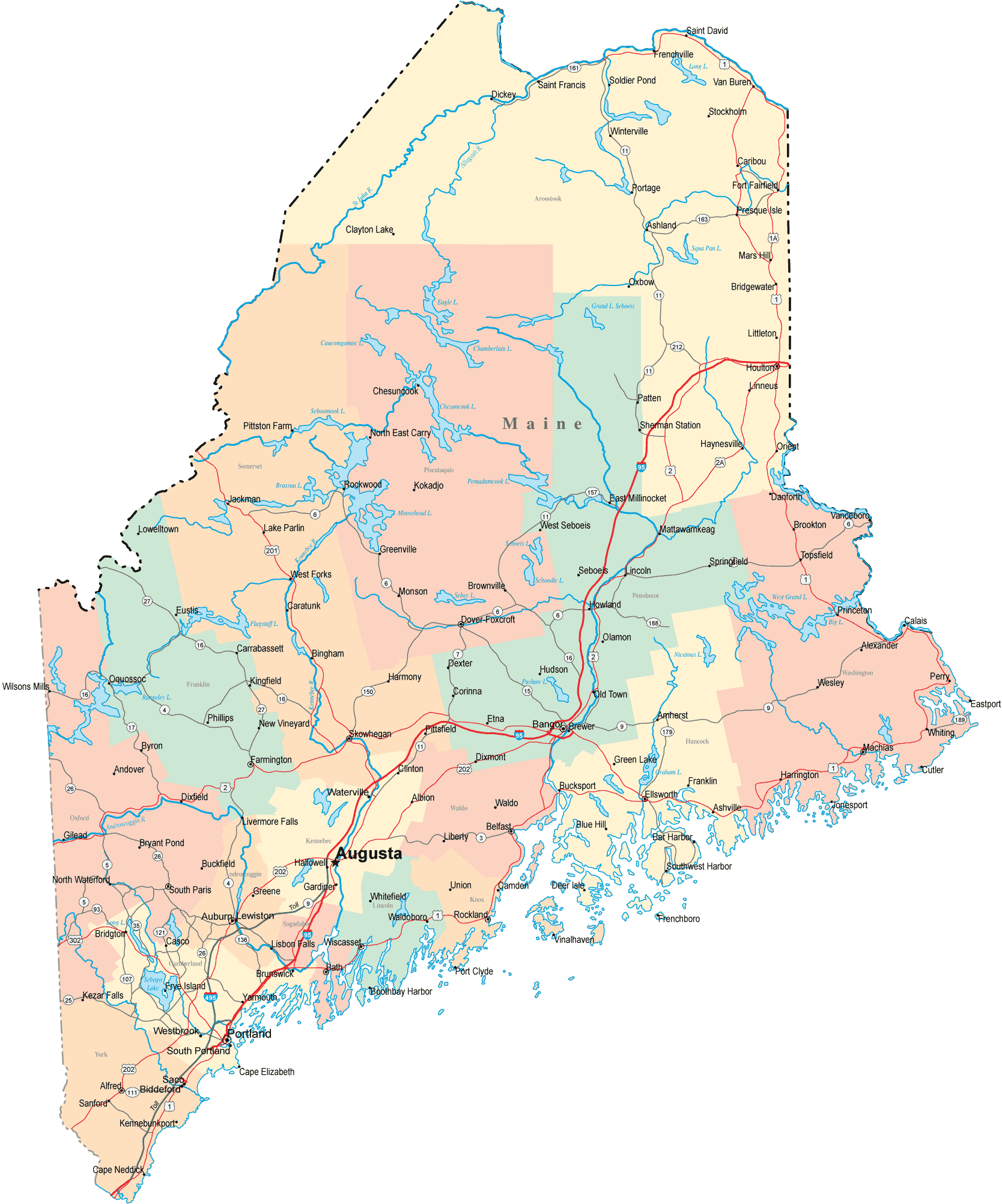Blue Highways: Somewhere on the Atlantic Ocean
Unfolding the Map
 William Least Heat-Moon (LHM) leaves Ghost Dancing on the shore and goes out on a fishing trawler from Cape Porpoise, Maine for a day. The interest in fishing, or at least the more dangerous aspects of it, has skyrocketed since the success of the reality TV show The Deadliest Catch. Since one side of my family is a fishing family, it brings back a lot of memories and reminiscences for me. Warning, my spot on the map is probably not accurate, but it will do. To see the area where I think the Allison E. may have been trolling around, sail on over to the map.
William Least Heat-Moon (LHM) leaves Ghost Dancing on the shore and goes out on a fishing trawler from Cape Porpoise, Maine for a day. The interest in fishing, or at least the more dangerous aspects of it, has skyrocketed since the success of the reality TV show The Deadliest Catch. Since one side of my family is a fishing family, it brings back a lot of memories and reminiscences for me. Warning, my spot on the map is probably not accurate, but it will do. To see the area where I think the Allison E. may have been trolling around, sail on over to the map.
Book Quote
"Four o'clock: On the open sea. Making ten knots, fast enough to raise a wake as high as the transom. The forty-foot Allison E. rides up the swells and down the other side. Up, down, up, down...
"Four-fifty: Lights of Cape Porpoise gone from the horizon. Eastern sky cold and gray. Tom says, 'We can fish in a good year only about two hundred days. Whatever income from dragging we'll earn, we've got to earn then. We can't ever make up for a day lost...
"Five-thirty: Rain stops. Ten miles offshore and towing at three knots over an area in the Gulf of Maine known as Perkins Ground of Bigelow Bight. Two hundred forty feet below on the mud, sand, and gravel, the net rouses bottomfish as they bump up into the 'sweep' and on back into the rear bag called the 'cod end.'
Eight o'clock: Sun out....The weight of the net pulls the boat backwards until we are above it. An aura of anticipation. A crew gets paid only for its share of the catch. There are no salaries."
Blue Highways: Part 9, Chapter 3
 Stern of a Cape Porpoise, Maine fishing trawler. Photo by Michael O'Brien and found on his Flickriver page. Click on photo to go to host page.Somewhere on the Atlantic Ocean
Stern of a Cape Porpoise, Maine fishing trawler. Photo by Michael O'Brien and found on his Flickriver page. Click on photo to go to host page.Somewhere on the Atlantic Ocean
In my previous post, I made reference to going out on the ocean in a boat. I would love to say that, given the fishing and oceangoing history of my family on my mother's side, I would take to the water. Unfortunately, that has not been the case.
I have referred before to my uncles and perhaps to my grandfather. They have all been fishermen. My grandfather was originally a fisherman, and only left the sea for a while during the Great Depression when he became a logger and, when the logging wasn't good, worked for the Works Progress Administration. His sons, Elwin and Bob, both became fishermen like their father. My uncle Elwin fished halibut and other bottom fish on his boat Norcoaster much like is described by LHM on his time out on the Allison E. in Maine. My uncle Bob, still fishing today in his 80s on his boat Kristy, concentrated on salmon and crab. I remember when they would go out fishing, and the whole family waited for news - did Betty hear from Elwin or has anyone heard from Bob? My aunt Betty communicated with uncle Elwin via a shortwave radio, as I believe my aunt Cecilia did with uncle Bob.
The lack of any major incidents on the high seas always masked the fact, to me at least, that fishing was tough, tough business. I suppose I always thought of my uncles piloting their boats through pristine waters at all times. Sure, other fishermens' boats sometimes sank, but not my uncles' boats. Very occasionally, a fisherman would die. But my uncles always came back from their trips. I remember them often having good trips, and coming back with full holds. Unlike the Allison E., whose captain tells LHM that the boat is too small to make overnight trips, my uncles would spend a week or more on the water. They even took part at times in experiments conducted by the government, which paid fishermen to try new fishing techniques such as long-lining for tuna. On those trips, they would fish their way across the Pacific to Hawaii and back.
As overfishing led to regulations in California, my uncles began to fish farther and farther from home, first off Oregon and Washington. Uncle Elwin bought a home on the San Juan de Fuca Strait, and fished from there up to Alaska. When the season went to a week, then down to three days, Uncle Elwin and his crew, which often included his son Bob and even his daughter Gina, cruised up to Alaska and then fished in deep and rough waters around the clock. I have seen some of their home movies, showing enormous fish on the deck, and crew cutting and carrying them to the hold.
My uncle took my father fishing once or twice up to Alaska, in an attempt to dry him out and keep him away from the booze. I think it worked as long as my father was on the boat. When the trip was over, my father just went back to drinking again. I thought about doing one of those trips myself, signing on as a crewmember with my uncle and earning some good money fishing. I heard the stories about the poker games on board at night, after dinner and, if a crewmember was off duty, even some alcohol. There were also stories about "exotic" fishing towns, rough bars, and lusty women. I just had one small and minor problem.
I have always been prone to motion sickness.
I grew up in a small coastal town where the only way in and out was on winding, twisting roads. As a child, these roads were torture to me. We'd carry a coffee can lined with a plastic bag in the car so that I could puke in it as needed. It took me until I was at least nine or ten years old before I could get past those roads with a reasonable chance of not vomiting.
While I outgrew my car sickness, I suppose I should have been surprised when I discovered, on a cruise vacation to Alaska that my family made on a Soviet cruise ship, that if I was inside and the ship rocked a little, I would get nauseated. And if the ship rocked a lot, I would be full-flown seasick.
I thought the answer was being outside, on a boat's deck, in the fresh air. A ferry trip across the San Juan de Fuca Strait from Victoria, British Columbia to Port Angeles, Washington led me into that little fallacy. It was very windy and wavy, but I had a great time on the prow of the boat as it went up and down, up and down, like LHM describes. The only time I had trouble was when I went inside, but as long as I was on the deck I had no symptoms at all.
But then, a whale watching expedition out of my hometown that I took with my wife dashed that belief. On the deck of the little boat, I sat in the back, only occasionally glancing at the flukes and the spouts of the whales as the boat bobbed in the water matching the whales' speed. I probably should have allowed myself to heave over the side, but instead, I held back the nausea and quietly rejoiced when we got back into port.
I'm afraid that I would not have made a good crewmember for my uncle unless I could have outgrown my seasickness the way that I outgrew my car sickness. And until then, any fishing trips would have been torture. I still think twice about taking a boat on the open water, just because I don't like feeling nauseated. Given all the dangers of fishing, the inconvenience of seasickness seems like a small one, but my uncles always seemed larger than life to me - men who tamed the sea. It's enough, and amazing to me that they tamed their inner ears and their stomachs while working an immensely dangerous occupation.
Musical Interlude
One of my favorite songs, is about Maine and fishing. The song is called The Reach, by Dan Fogelberg, who lived in Maine and died of cancer only a few years ago. At the end of the video, you can see him on the sailboat he owned in Maine, the Minstrel.
This next song is a whimsical one by Lyle Lovett called If I Had a Boat. I don't know why I include it, except that I like how it mixes two things that are almost mutually exclusive - riding ponies on boats.
If you want to know more about the Maine fishing industry
Fishwatch - Maine Haddock
Historical Maine Commercial Marine Fisheries Landing Data
Maine Commercial Marine Fisheries
Mapping Maine's Commercial Fisheries
Saltwater Fishing in Maine
State of Marine Fisheries in Main 2008
Next up: Boston, Massachussetts




 Tuesday, July 24, 2012 at 3:26PM
Tuesday, July 24, 2012 at 3:26PM





